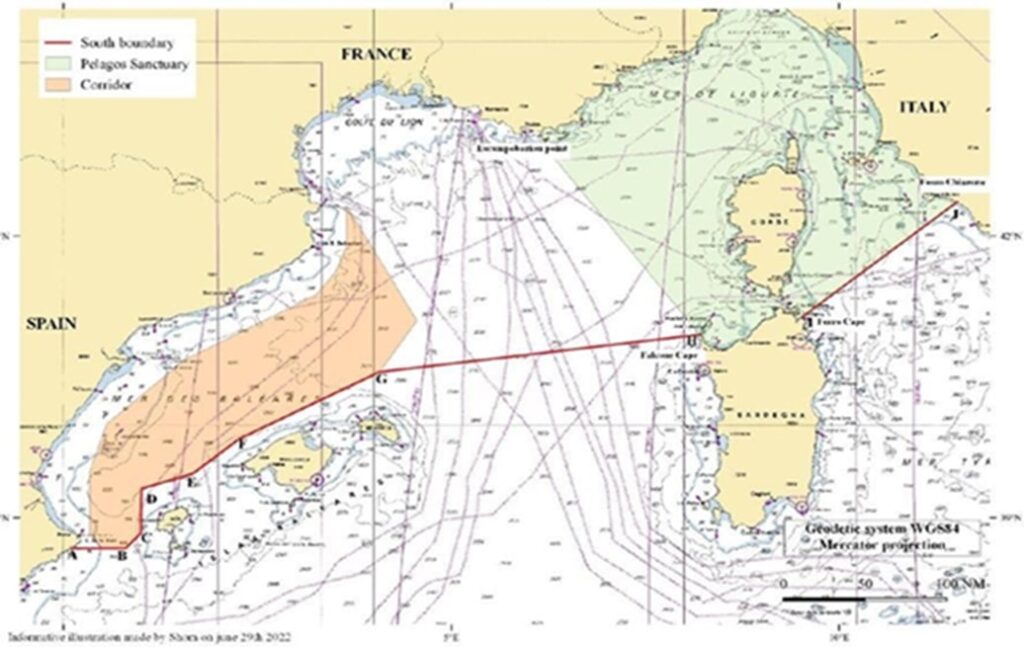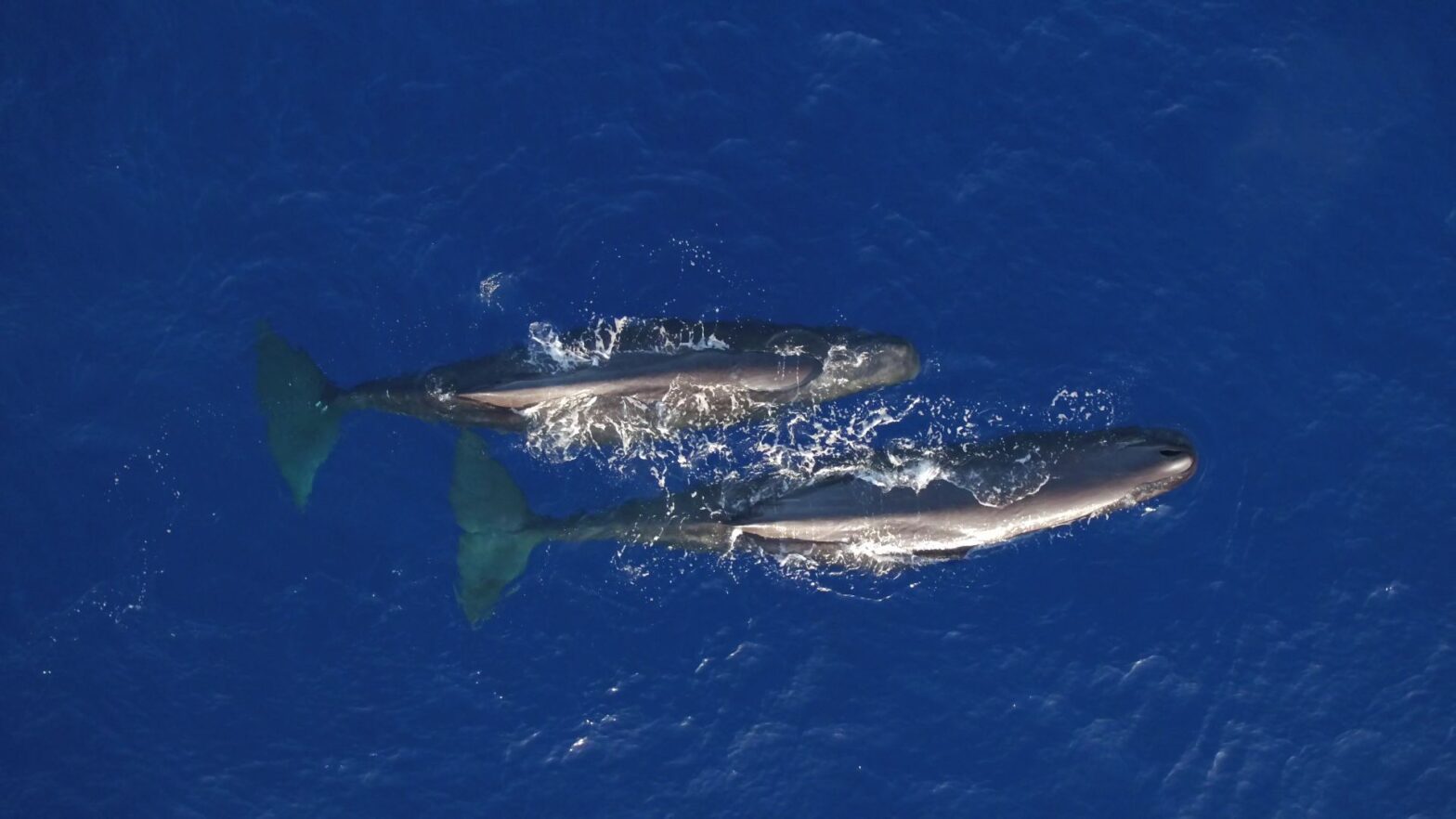NEWS from the IMO in London: NW-Mediterranean declared as PSSA to protect endangered whales from ship strikes!
North-Western Mediterranean Sea designated as Particularly Sensitive Sea Area by the International Maritime Organisation.
- Its main objective is to reduce the major cause of mortality of sperm whales and fin whales in this area of intense maritime traffic: collisions with ships.
- OceanCare applauds the decision as a positive first step for the protection of the great whales, but believes that to ensure its effectiveness, the approved speed reduction measure should have been made mandatory.
The Marine Environment Protection Committee (MEPC) of the International Maritime Organisation (IMO), the United Nations agency in charge of regulating maritime transport, has decided, at the proposal of Spain, France, Italy and Monaco, to declare the North-Western Mediterranean region as a Particularly Sensitive Sea Area (PSSA) with the aim of reducing ship strikes of large endangered whales (sperm whales and fin whales), which still inhabit this area of intense maritime traffic (see map at the end of the press release).
The designation of this PSSA comes with an explicit recognition by the IMO that ship strikes are the main cause of human-induced death for fin and sperm whales in this part of the Mediterranean. Vessel movements in this area are very high, in the order of 220,000 per year, with average speeds of between 14 and 20 knots in the case of merchant vessels or even up to 35 knots in the case of high-speed vessels.
“The IMO has taken a significant first step in the right direction by finally approving the designation of a Particularly Sensitive Sea Area in these environmentally valuable waters, but the ship speed reduction measure included in its proposal should have been made mandatory to ensure its effectiveness in reducing the risk of lethal collisions with great whales”, comments Nicolas Entrup, Director of International Relations at the marine protection organisation OceanCare, the decision.
Scientific knowledge on the distribution and habitat use of these large cetaceans has concluded that in this part of the Mediterranean it is still difficult to predict the areas where these mammals are present at any given time, so the option for vessels to divert their routes to avoid colliding with them is not feasible in this case. Therefore, there is only one proven measure to reduce the risk of fatal collisions: reducing the speed of vessels.
Indeed, in November 2021, the Scientific Committee of the Agreement on the Conservation of Cetaceans of the Black Sea, Mediterranean Sea and Contiguous Atlantic Area (ACCOBAMS) adopted a recommendation stressing that “when it is not possible to establish routes to keep whales separated from ships, the only proven measure to reduce fatal collisions with most large whales is to reduce speed”.
In December 2022, all Mediterranean Basin States agreed at an ACCOBAMS meeting (Resolution 8.17): to “promote the application of vessel speed reductions (e.g., slow steaming) as an operational measure that results in multiple environmental benefits, including the reduction of underwater noise and greenhouse gas emissions, as well as of the risk of ships strikes, and to promote such measures in the context of the proposal of Particularly Sensitive Sea Area in the North-western Mediterranean”.
The impact of ship strikes is now recognised internationally as a major threat to cetaceans, especially as shipping traffic, vessel size and speed continue to increase. Collisions involve a wide variety of vessels, and the risk of collision increases with vessel speed (as does the severity of injury to the animal).
The best available scientific evidence indicates that the likelihood of a collision having a lethal effect on a whale is very low when the speed of the vessel does not exceed 10 knots.
Associated protective measures for the PSSA
The associated protective measures (APMs) approved are deemed to be applied by any commercial ships and pleasure yachts from 300 gross tonnage and upwards but they are merely recommendatory. The APMs would not apply to any warship and other governmental ships operated for non-commercial purposes.
Thus, it is proposed that: “Mariners should navigate with particular caution within the NW Med PSSA, in areas where large and medium cetaceans are detected or reported, and reduce their speed to between 10 and 13 knots as voluntary speed reduction (VSR). However, a safe speed should be kept, so that proper and effective action could be taken to avoid collision and any possible negative impacts on ship’s manoeuvrability”.
For OceanCare: “Only the adoption of a mandatory vessel speed reduction measure would effectively protect large whales while creating a level playing field for all shipping companies,” said Carlos Bravo, OceanCare’s representative in Spain, who is attending the IMO MEPC meeting in London.
IMO’s own MEPC Resolution for the designation of the PSSA recognises that “the whale population has suffered ship strikes in the region and therefore the cetacean population is at risk. Without associated protective measures to mitigate the risk of collision within the perimeter of the PSSA, a decline in the populations of medium and large cetaceans is to be expected. Implementing a speed reduction strategy will allow a significant decrease in the likelihood of collision and fatal wildlife-related injuries”.
Description of the area included in the PSSA
The NW Mediterranean PSSA comprises the waters between Valencia and Genoa, defined by cetacean researchers as critical habitat for fin whales and sperm whales, and includes areas of extreme environmental value. These include:
- the Mediterranean Cetacean Migration Corridor, located between the coast of Catalonia and Valencia and the Balearic Islands, declared a Marine Protected Area by the Spanish Government and a Specially Protected Area of Mediterranean Importance (SPAMI) by the Barcelona Convention,
- the Pelagos Cetacean Sanctuary in the Ligurian Sea,
- the Important Marine Mammal Areas (IMMA) called “Gulf of Lions Shelf” and “Slopes and Canyons System of the North-Western Mediterranean Sea”.
In addition to fin whales and sperm whales, the Northwestern Mediterranean PSSA is frequented by several species of cetaceans, of which, in addition to the above two, six others are regularly present throughout the year: Cuvier’s beaked whales and pilot whales, Risso’s dolphins, bottlenose dolphins, striped dolphins and common dolphins.
The importance of this area for fin whales is evident: the estimated abundance of this species within the PSSA represents around 67% of the entire Mediterranean population, according to recent ACCOBAMS data, published in 2021. As for the sperm whale, compared to the total Mediterranean estimate of about 1,400 individuals, a 2017 published estimate made in half of the proposed PSSA (the entire Pelagos Sanctuary and French waters) was between 300 and 600 individuals, with higher numbers in winter.
From the mid-1990s to the mid-2000s, the Mediterranean Sea has experienced a 58% increase in shipping capacity, coupled with a 30% increase in vessel size since 1997. Shipping in the Mediterranean basin is expected to increase in the coming years, both in number of routes and in intensity, especially in connection with the expansion of the Suez Canal.
Ship collisions with these large whales contribute significantly to the continuing decline in abundance of individuals of these two species, and there is a risk that they will eventually disappear from the region. In fact, subpopulations of fin and sperm whales in the Mediterranean Sea are classified as endangered on the International Union for Conservation of Nature (IUCN) Red List, and the fin whale population has recently been estimated to be only about 1,800 mature animals, half of what was previously estimated.
Map of the North-Western Mediterranean PSSA (Source: SHOM)

It comprises the marine area from the coast of the countries involved (Spain, France, Italy and Monaco) to the red line.
Notes
Reducing the speed of ships has a number of environmental benefits. It has been demonstrated that, among the various operational measures available, speed reduction is the most cost-effective way to reduce the environmental impact of shipping, enabling emissions of greenhouse gases and air pollutants such as sulphur oxides (SOx), nitrogen oxides (NOx) and black carbon, as well as underwater noise, to be reduced very significantly and with immediate effect. In this respect, scientific data show that a 10% decrease in ship speed across the world fleet could reduce shipping noise by 40%.
